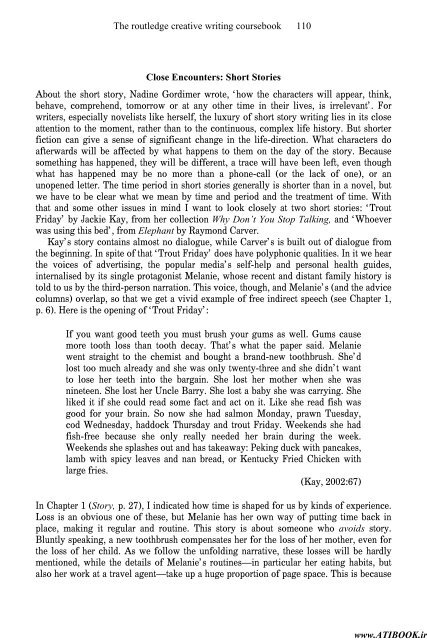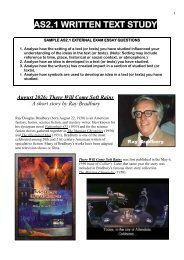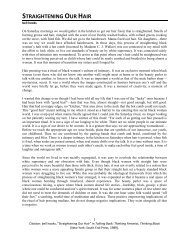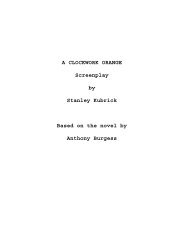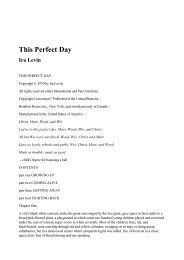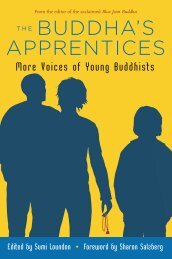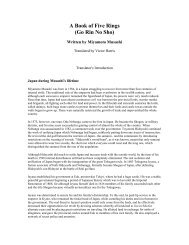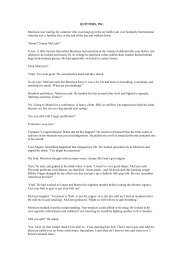9780415317856_the_routledge_creative_writing_coursebook
9780415317856_the_routledge_creative_writing_coursebook
9780415317856_the_routledge_creative_writing_coursebook
You also want an ePaper? Increase the reach of your titles
YUMPU automatically turns print PDFs into web optimized ePapers that Google loves.
www.ATIBOOK.irThe <strong>routledge</strong> <strong>creative</strong> <strong>writing</strong> <strong>coursebook</strong> 110Close Encounters: Short StoriesAbout <strong>the</strong> short story, Nadine Gordimer wrote, ‘how <strong>the</strong> characters will appear, think,behave, comprehend, tomorrow or at any o<strong>the</strong>r time in <strong>the</strong>ir lives, is irrelevant’. Forwriters, especially novelists like herself, <strong>the</strong> luxury of short story <strong>writing</strong> lies in its closeattention to <strong>the</strong> moment, ra<strong>the</strong>r than to <strong>the</strong> continuous, complex life history. But shorterfiction can give a sense of significant change in <strong>the</strong> life-direction. What characters doafterwards will be affected by what happens to <strong>the</strong>m on <strong>the</strong> day of <strong>the</strong> story. Becausesomething has happened, <strong>the</strong>y will be different, a trace will have been left, even thoughwhat has happened may be no more than a phone-call (or <strong>the</strong> lack of one), or anunopened letter. The time period in short stories generally is shorter than in a novel, butwe have to be clear what we mean by time and period and <strong>the</strong> treatment of time. Withthat and some o<strong>the</strong>r issues in mind I want to look closely at two short stories: ‘TroutFriday’ by Jackie Kay, from her collection Why Don’t You Stop Talking, and ‘Whoeverwas using this bed’, from Elephant by Raymond Carver.Kay’s story contains almost no dialogue, while Carver’s is built out of dialogue from<strong>the</strong> beginning. In spite of that ‘Trout Friday’ does have polyphonic qualities. In it we hear<strong>the</strong> voices of advertising, <strong>the</strong> popular media’s self-help and personal health guides,internalised by its single protagonist Melanie, whose recent and distant family history istold to us by <strong>the</strong> third-person narration. This voice, though, and Melanie’s (and <strong>the</strong> advicecolumns) overlap, so that we get a vivid example of free indirect speech (see Chapter 1,p. 6). Here is <strong>the</strong> opening of ‘Trout Friday’:If you want good teeth you must brush your gums as well. Gums causemore tooth loss than tooth decay. That’s what <strong>the</strong> paper said. Melaniewent straight to <strong>the</strong> chemist and bought a brand-new toothbrush. She’dlost too much already and she was only twenty-three and she didn’t wantto lose her teeth into <strong>the</strong> bargain. She lost her mo<strong>the</strong>r when she wasnineteen. She lost her Uncle Barry. She lost a baby she was carrying. Sheliked it if she could read some fact and act on it. Like she read fish wasgood for your brain. So now she had salmon Monday, prawn Tuesday,cod Wednesday, haddock Thursday and trout Friday. Weekends she hadfish-free because she only really needed her brain during <strong>the</strong> week.Weekends she splashes out and has takeaway: Peking duck with pancakes,lamb with spicy leaves and nan bread, or Kentucky Fried Chicken withlarge fries.(Kay, 2002:67)In Chapter 1 (Story, p. 27), I indicated how time is shaped for us by kinds of experience.Loss is an obvious one of <strong>the</strong>se, but Melanie has her own way of putting time back inplace, making it regular and routine. This story is about someone who avoids story.Bluntly speaking, a new toothbrush compensates her for <strong>the</strong> loss of her mo<strong>the</strong>r, even for<strong>the</strong> loss of her child. As we follow <strong>the</strong> unfolding narrative, <strong>the</strong>se losses will be hardlymentioned, while <strong>the</strong> details of Melanie’s routines—in particular her eating habits, butalso her work at a travel agent—take up a huge proportion of page space. This is because


